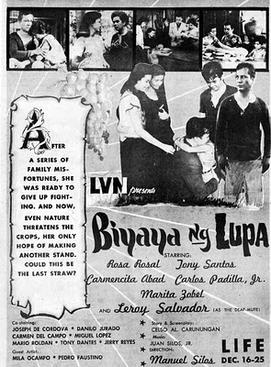
ABS-CBN Film Productions, Inc. is a Filipino film studio and film and television production company and film distributor headquartered in Quezon City. It is one of the major film studios in the Philippines, along with Viva Films and Regal Entertainment. Star Cinema has produced and released most of the highest-grossing Philippine films of all time. Star Cinema, along with its subsidiaries and the now-defunct MOR 101.9 Manila, forms the Star Creatives Group, the main entertainment division of media conglomerate ABS-CBN Corporation.

LVN Pictures, Inc. was a Filipino film studio that was considered one of the biggest in the history of Philippine cinema and its foremost establishment in motion picture post-production until 2005. In its heyday of motion picture production, LVN Pictures has been compared to that of the Metro-Goldwyn-Mayer Studios (MGM) of Hollywood because it had, under contract, the biggest stars and film craftsmen of the period. Before its closure in 2005, LVN Pictures was known as one of the oldest living film studios in the country.
Giliw Ko is a 1939 Filipino film. A musical romance, Giliw Ko had a radio theme, and was the first production of the Filipino company, LVN Pictures. The restored film is notable for being a gift from Australia to the Filipino people to commemorate 100 years of independence. It was directed and written by Carlos Vander Tolosa, and starred Mila del Sol, Fernando Poe, Sr., Ely Ramos and Fleur de Lis. The film made a milestone by being the first to show a woman in a bathing suit worn by Fleur de Lis.

Lamberto Vera Avellana was a prominent Filipino film and stage director. Despite considerable budgetary limitations that hampered the post-war Filipino film industry, Avellana's films such as Anak Dalita and Badjao attained international acclaim. In 1976, Avellana was named by President Ferdinand Marcos as the first National Artist of the Philippines for Film. While Avellana remains an important figure in Filipino cinema, his reputation as a film director has since been eclipsed by the next wave of Filipino film directors who emerged in the 1970s, such as Lino Brocka and Ishmael Bernal.

Kisapmata is a 1981 Filipino psychological horror film directed by Mike de Leon, with a screenplay by de Leon, Clodualdo del Mundo Jr., and Raquel Villavicencio. It stars Vic Silayan, Charo Santos, Jay Ilagan, and Charito Solis.

Alice Bueñaflor Lake, better known by her stage name Anita Linda, was a Filipino film actress. A romantic lead in her youth, she later gained critical acclaim for her portrayals in maternal or elderly roles. At the age of 74, she became the oldest actress to ever win a FAMAS Award, when she was named Best Supporting Actress for Ang Babae sa Bubungang Lata.

Oro, Plata, Mata is a 1982 Philippine historical war drama film directed by Peque Gallaga, from a story by Peque Gallaga, Mario Taguiwalo, and Conchita Castillo and screenplay by José Javier Reyes. The film is considered to be Gallaga's most significant contribution to the Philippine cinema. Set in the Philippine island of Negros during World War II, it tells the story of how two hacendero families cope with the changes brought about by the war. In translation, the movie is also known either as "Gold, Silver, Bad Luck" or "Gold, Silver, Death."
The 9th Metro Manila Film Festival was held in 1983. Only eight movies participated.
Phillip Mikael "Ipe" Reyes Salvador (born Felipe Reyes Salvador is a three-time FAMAS award-winning Filipino film and television actor.

Blessings of the Land is a 1959 Filipino drama film directed by Manuel Silos. It was entered into the 10th Berlin International Film Festival. The film won Best Picture and Best Story from the Filipino Academy of Movie Arts and Sciences. In 1960, it was shown at the Asian Film Festival held in Tokyo. The story was written by Celso Al. Carunungan, while the screenplay was written by Carunungan together with Pablo Naval. The movie was produced by LVN Pictures.

Child of Sorrow is a 1956 Philippine crime drama-tragedy film written by Rolf Bayer and directed by Lamberto V. Avellana. Set in the slums of Manila, recovering from the aftermath of the Second World War, the story follows Cita, a prostitute with good intentions and Vic, a war hero who served in the Korean War under PEFTOK, living together in the ravaged capital but when they were involved with Cardo's nasty plans, they, along with Father Fidel, join forces to stop him to succeed.
The ABS-CBN Film Archives, also called ABS-CBN Archives, is a state-of-the-art film archive in the Philippines located at the basement of ELJ Communications Center in Eugenio Lopez Drive, Diliman, Quezon City. It was a member of the Southeast Asia-Pacific Audio-Visual Archive Association, as well as the Society of Filipino Archivists for Film or Sofia. At present, ABS-CBN Film Archives holds about 2,400 Filipino films from Star Cinema, LVN Pictures, Regal Films, VIVA Films, Seiko Films, Cinema Artists, Sampaguita Pictures, OctoArts Films, Imus Productions, RVQ Productions, Cine Suerte, NV Productions along with the cinema libraries of Dolphy, Nora Aunor, Fernando Poe Jr., Rudy Fernandez, Ramon Revilla, and Armida Siguion-Reyna. ABS-CBN Film Archives held the largest film collection in the country. It was headed by Leo Katigbak.

Kakabakaba Ka Ba? is a 1980 Filipino musical comedy film directed by Mike de Leon, with a screenplay Clodualdo del Mundo Jr., and Raquel Villavicencio. It stars Christopher de Leon, Charo Santos, Jay Ilagan, and Sandy Andolong as two pairs of lovers who accidentally find themselves in the middle of a conflict between the agents of rivaling Japanese and Chinese drug syndicates. The film features cameos made by APO Hiking Society members Boboy Garovillo, Danny Javier, and Jim Paredes.

Of the Flesh is a 1983 Philippine drama film directed by Marilou Diaz-Abaya. It was adapted and written by Ricky Lee from the legal story "To Take a Life" by Teresa Añover Rodriguez and produced by Benjamin G. Yalung. It sets in the 1930s during the American colonial era and it tells the story of a newly-wed couple Narcing and Puring arrived from Manila in the town of Mulawin, a place where it was filled with violent and tragic pasts and it has been similarized to Hell by the Storyteller, played by Charito Solis. As they arrive, they will witness all of the misfortunes and violent actions as it tackles rape, incest, parricide, and tyranny that has been tainted in the town's heart by the cruel man Gusting.
ABS-CBN Film Restoration Project or also known as Sagip Pelikula, was a digital film restoration project of ABS-CBN Corporation in partnership with Central Digital Lab. The project is headed by Leo Katigbak of ABS-CBN Film Archives and Manet Dayrit of Central Digital Lab. The goal of the project is to digitally restore and remaster select Filipino films from the archives of ABS-CBN. Since the beginning of the project in 2011, the project has successfully digitized, restored, and remastered over one hundred Filipino films into a 1080p or 2K Digital Cinema Package format with a maximum resolution of 2048x1080 pixels at 24 frames per second. These films have been released through a wide array of platforms including limited theatrical runs, film festivals, free-to-air and cable television, DVDs, pay per view, and over-the-top content platforms such as iTunes. All of the restoration process are done by Central Digital Lab in the Philippines with the exception of Kakabakaba Ka Ba? and Tatlong Taong Walang Diyos which were commissioned by ABS-CBN to be restored abroad by L’Immagine Ritrovata in Bologna, Italy and was supervised by Davide Pozzi. All copyrights to the films restored and remastered are owned in perpetuity by ABS-CBN Corporation.

The Captive Virgins is a controversial 1977 Philippine period drama film produced by Armida Siguion-Reyna and directed by Mario O'Hara and Romy Suzara. The movie served as a commentary on the state of the Philippines in the 1920s during the American colonial period.

Malvarosa is a 1958 Filipino family drama film directed by Dr. Gregorio Fernandez and written by Clodualdo del Mundo and Consuelo P. Osorio for LVN Pictures. It is based on a comics serial of the same name written by Clodualdo del Mundo in Espesyal Komiks and tells the story of a poverty-stricken nuclear family living in the nearby railroad tracks who carry their own burdens that needed to resolved.

A Speck in the Water is a 1976 Philippine drama film written by Jorge Arago and directed by Ishmael Bernal. It tells the story of a love triangle in the impoverished village involving Benjamin, a fisherman in Laguna de Bay, and two women in the villageーChedeng, a soon-to-be midwife, and Maria, a beautiful young woman from the barrio.
Karma is a 1981 Philippine romantic drama film directed by Danny L. Zialcita from a written story by Sylvia Barretto and screenplay by Zialcita. The film stars Vilma Santos and Ronaldo Valdez in their respective roles as Sarah and Eric, the reincarnation of the past lovers Guada and Enrico, who were killed by Limbo. After they reincarnated, Sarah and Eric will cross paths with each other because of destiny but their love will be a center of jealousy from their respective lovers, Sara's fiance Alfredo and Cristy.
Cain and Abel is a 1982 Philippine action thriller drama film directed by Lino Brocka from a written story and screenplay by Ricardo "Ricky" Lee. The film's story was inspired by the Biblical story of two brothers, Christopher de Leon and Phillip Salvador respectively played the roles of Ellis and Lorenzo, the two brothers and sons of Senyora Pina, who have different views on each other. However, the sibling rivalry became violent and bloody due to the issue of inheritance of their family land and Senyora Pina's favoritism to her younger son. It also stars Carmi Martin as Zita, Ellis's fiancée from Manila; Cecille Castillo as Rina, the house helper, and Ellis's other woman; and Baby Delgado as Becky, Lorenzo's wife.













